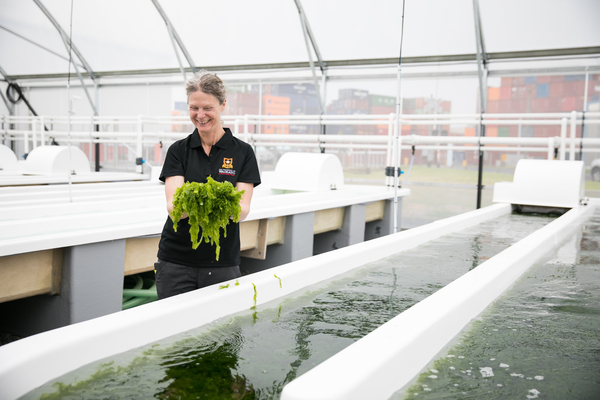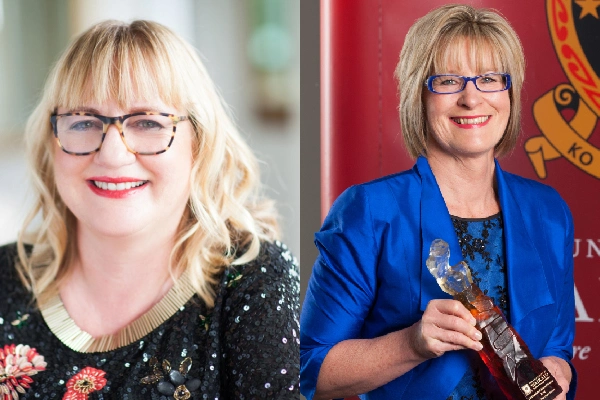The University of Waikato has achieved significant results in this year's Ministry of Business, Innovation and Employment Endeavour Fund.
One Research Programme and four Smart Ideas projects have been awarded grants through the highly contested fund.
Deputy Vice-Chancellor Research Professor Gary Wilson says this is a great boost for our research efforts at the University of Waikato and recognition that our researchers are making a difference for industry, society and our environment.
Seaweed polysaccharides: structure/activity driven elicitor design for plant immunity ($11.4m over 5 years)

Dr Marie Magnusson from the School of Science will lead a group to research whether seaweed can boost plants’ natural defences against a variety of pathogens, which could positively impact global food production.
Currently, synthetic crop protection products (CPPs) are used in farming to prevent crop losses from diseases, cutting losses by at least 50%. But there are growing concerns about their environmental and health implications, and their effectiveness, due to resistant pathogens.
Dr Magnusson says there’s an increasing demand for eco-friendly alternatives.
“Our goal is to develop high-value, seaweed-derived polysaccharide products into effective, low-impact CPPs for agriculture and horticulture,” she says.
By using plant immune system enhancers derived from seaweed, we could guard against multiple types of diseases and reduce the need for synthetic chemicals.
The effectiveness of the products will be tested on kiwifruit, apple and tomato, before expanding to other globally important crops like wheat.
The technology development is integrated with Māori-led research focused on developing a best practice framework for the development of bioproducts from taonga species
Dr Magnusson leads a multidisciplinary research group at the University of Waikato delivering fundamental and applied science to underpin the development of a sustainable seaweed aquaculture industry in New Zealand. She is passionate about providing real-world solutions to people, communities and industry using science.
She will work alongside University of Waikato researchers, including Dr Christopher Glasson and Associate Professor Maui Hudson, Victoria University’s Dr Chelsea Vickers, Dr Joel Vanneste of Plant & Food Research and Dr Philipp Lemke of the University of Munster.
A Kāhui Māori (advisory board) will guide the research, drawing on Te Nohonga Kaitiaki Guidelines and Biocultural Labels to enable fairness and benefit sharing.

Left to right: Dr Marie Magnusson, Dr Mohammad Dalour Beg, Dr Deniz Özkundakci, Dr Melanie Ooi, Dr Anany Dwivedi and Dr Krishanu Roy
Smart Ideas (each funded $1m over 3 years)
Functionally graded cellulose foam packaging from recycled cardboard fibre
Senior Research Fellow in the School of Engineering, Dr Mohammad Dalour Beg, will aim to create sustainable alternatives to conventional packaging.
Currently, non-biodegradable and costly plastic foams and polystyrene are used to protect delicate items like electronics and glass. The research team will look to produce and develop recyclable cellulose foams of varying density and strength from recycled cardboard and harakeke fibres, potentially cutting packaging’s carbon footprint by up to 80%.
LakeCast: enhancing lake ecosystem management with multisource integrated data and ecological forecasts
Dr Deniz Özkundakci and Dr Melanie Ooi from the School of Science will combine machine learning techniques with ecosystem-informed models to predict changes in water quality of freshwater ecosystems.
This approach will provide early warnings and actionable insights to regional councils and iwi, improving data synthesis and forecast accuracy.
Lightmyography-based, wearable, muscle-machine interfaces for intuitive control of medical devices
This Smart Ideas research project, led by Dr Anany Dwivedi within the University’s Artificial Intelligence Institute, will harness properties of light to decipher the intricacies of natural muscle movements, to enhance prosthetic and assistive devices, improving their users’ autonomy and quality of life.
Self-sensing, low-carbon 3D-printed homes from locally sourced waste materials
Dr Krishanu Roy, Senior Lecturer in the School of Engineering, is addressing New Zealand’s housing shortage by developing a low-carbon, self-sensing, 3D-printable concrete mix using locally sourced materials.
The project could reduce the construction industry’s carbon footprint, which currently contributes 20% of the country’s greenhouse gas emissions.
Derisking carbon dioxide removal at megatonne scale in Aotearoa ($2m over 5 years)
The University is also a major subcontractor on a successful proposal led by the University of Canterbury that investigates three alternative carbon dioxide removal technologies that can potentially replace carbon forestry by at least one million tonnes of CO2 removals per year.
These include bioenergy carbon capture, enhanced rock weathering, and direct air capture.
The project will be led by Canterbury's Associate Professor David Dempsey and supported by Waikato researchers Professor Barry Barton, Dr Jennifer Campion, Dr Terry Isson, Dr Andrew la Croix and Professor Louis Schipper.



